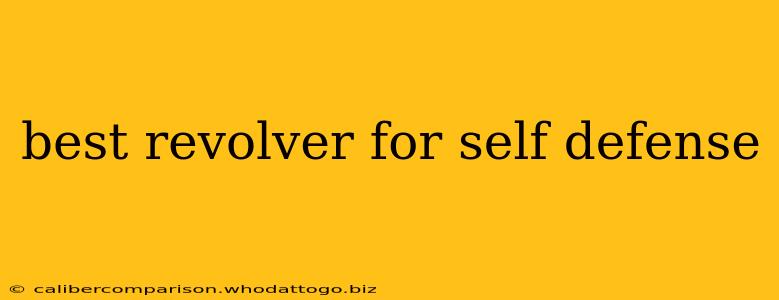Choosing the right firearm for self-defense is a deeply personal decision, demanding careful consideration of various factors. While personal preferences and individual needs significantly influence the selection process, this guide will explore key features to help you determine the best revolver for your self-defense needs. We will analyze aspects like caliber, size, weight, reliability, and ease of use, ultimately guiding you towards an informed choice. Remember, responsible gun ownership includes thorough training and a deep understanding of local laws and regulations.
Key Considerations When Choosing a Self-Defense Revolver
Before diving into specific models, let's establish the crucial factors influencing the selection of a self-defense revolver:
1. Caliber: Finding the Right Stopping Power
The caliber of your revolver directly impacts its stopping power. Popular self-defense calibers include:
- .38 Special: A classic and reliable round, offering a good balance of stopping power and manageable recoil. Its widespread availability and affordability make it a popular choice.
- .357 Magnum: More powerful than .38 Special, the .357 Magnum delivers greater stopping power but with increased recoil. It's a potent round but requires more practice to manage effectively.
- .44 Special/.44 Magnum: These larger calibers offer substantial stopping power, but the recoil is significantly heavier, potentially affecting accuracy and control, especially for smaller individuals.
The best caliber depends on your physical strength, shooting experience, and comfort level. Beginners often find .38 Special easier to handle, while experienced shooters might prefer the increased power of .357 Magnum or even .44 Special.
2. Size and Weight: Concealability vs. Shootability
The size and weight of the revolver are critical, particularly for concealed carry. Smaller revolvers are more easily concealed but might be harder to shoot accurately due to reduced grip size and increased recoil. Larger revolvers offer better stability and control but are less discreet. Consider your lifestyle and carrying methods when evaluating this aspect.
3. Action Type: Double-Action vs. Single-Action
- Double-Action (DA): Cocking the hammer and firing the round are accomplished in one smooth motion. This is often preferred for self-defense due to its speed and simplicity.
- Single-Action (SA): Requires manually cocking the hammer before each shot. While offering a lighter trigger pull, it is slower for rapid follow-up shots. Many modern self-defense revolvers offer a double-action only (DAO) configuration for simplicity and safety.
4. Reliability: The Importance of Dependability
In a self-defense situation, reliability is paramount. Choose a revolver known for its robust design and consistent performance under stress. Regular cleaning and maintenance are crucial to ensuring the reliable function of any firearm.
5. Ease of Use: Intuitive Operation Under Pressure
The revolver should be intuitive and easy to operate, even under stress. A simple design, clear sights, and a smooth trigger pull can make a significant difference in a critical situation.
Top Revolver Contenders for Self-Defense
While specific model recommendations depend heavily on individual needs and preferences, some consistently highly-rated revolvers for self-defense include (but are not limited to):
- Smith & Wesson J-Frame: A popular choice for concealed carry due to its compact size and lightweight design. Typically chambered in .38 Special.
- Ruger LCR: Known for its lightweight construction and comfortable grip, often chambered in .38 Special or .357 Magnum.
- Taurus Judge: A unique revolver chambered for .410 shotshells or .45 Colt, offering significant stopping power but with substantial recoil.
Disclaimer: This information is for educational purposes only. Always consult with a firearms professional and thoroughly research local laws and regulations before purchasing or carrying any firearm. Safe gun handling practices are paramount.
Conclusion: Making the Right Choice
Selecting the best revolver for self-defense involves careful consideration of your individual needs, physical capabilities, and lifestyle. Prioritize reliability, ease of use, and the appropriate caliber for your comfort level and circumstances. Remember, responsible gun ownership involves ongoing training, consistent practice, and a deep understanding of the legal and ethical implications of self-defense. Ultimately, the "best" revolver is the one that best fits your specific requirements and provides you with the confidence and competence to use it effectively and responsibly.

